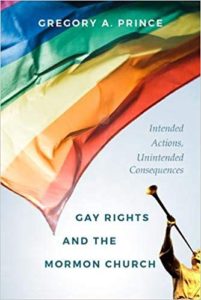 Title: Gay Rights and the Mormon Church: Intended Actions, Unintended Consequences
Title: Gay Rights and the Mormon Church: Intended Actions, Unintended Consequences
Author: Greg Prince
Publisher: University of Utah Press
Genre: History
Year Published: 2019
Number of Pages: 379
Reviewed by Conor Hilton, December 2019
I had high hopes for this book–the subject is of vital importance to the Church today and of personal interest (as a queer, asexual Mormon), and I think Prince’s biography of David O. McKay is essential reading for all Mormons. I was disappointed with Prince’s work here, which is still important.
Prince does cover a lot of ground, weaving together a narrative of the LDS church’s teachings and actions relating, almost exclusively, to gay men since the 60s. Prince has access to loads of sources that are involved in these events, though the Church refused to grant him access to materials, which means he relies on largely anonymous sources for perspective on the inner workings of the Church. Little in the book will be new to those that have followed and read and been engaged in LGBTQ+ issues and Mormonism for the past decade or so, though there was some material that was new to me.
The book has two major shortcomings:
- An almost exclusive focus on gay men, with only short chapters touching on lesbians, transgender Mormons, and intersex Mormons. Prince acknowledges this shortcoming and argues that its a reflection of the Church’s own focus on gay men, which I think shows a lack of understanding of the breadth and diversity of queer Mormon experiences. This lack of understanding is further demonstrated in the “trans” chapter where he repeatedly uses out of date terminology and seems to radically misunderstand the trans Mormon experience (at least from my understanding of the trans Mormons I know and their reactions to Prince’s work).
-
A tendency to make the worst possible case for the Church by decontextualizing information and editorializing in a way that obscures the distinction between fact and opinion. Look, the Church looks bad from what they actually did, there’s no need for Prince to turn the Church into a Cheney-in-VICE (2018)-esque supervillain. This undermines Prince’s intent and severely limits the audience that could find this book valuable. By trying to make the Church out to be worse than they are (which, again, in this particular arena is concerningly bad), Prince calls into question all the assertions that he makes. A part of this is the way that Prince fails to extend the Church any grace that they were acting in good faith and out of sincerely held beliefs. He could have done so and still held up the tragic and terrible consequences of those actions as evidence that they should change, but misses that opportunity.
Prince also seems to believe that if he can trace the origin of homosexuality to biology that the Church will suddenly accept it as a moral good, which seems misguided and oddly optimistic to me. Sure, such an understanding can lead to healthier discussion about homosexuality, but it seems to have little to no bearing on the way any given person views it morally. Anyway.
A book that had a lot of promise, but falls far short of its potential.

I felt the same way about the book–high hopes based on the subject manner and on my experience with Prince’s previous work. However, I also felt let down for both of the reasons you listed, as well as a few others. For example, Prince relies heavily on interviews, and even then only on interviews with a few people. There is little sense that many things about homosexuality and the Church have been published during the last 30-40 years, and very little engagement with any other scholarship or other writing. For example, I would have loved a chapter looking at the progression of popular memoirs about homosexuality from “Goodbye, I Love You” to “Born that Way”, to “In Quiet Desperation” to “That We May be One”. Or engagement with some of the scholarly or theological work that is being done by people like Taylor Petrey. The book gave me the sense of someone who thought they were doing pioneering work in uncharted territory, when in fact they had not realized that a lot had already been explored previously.